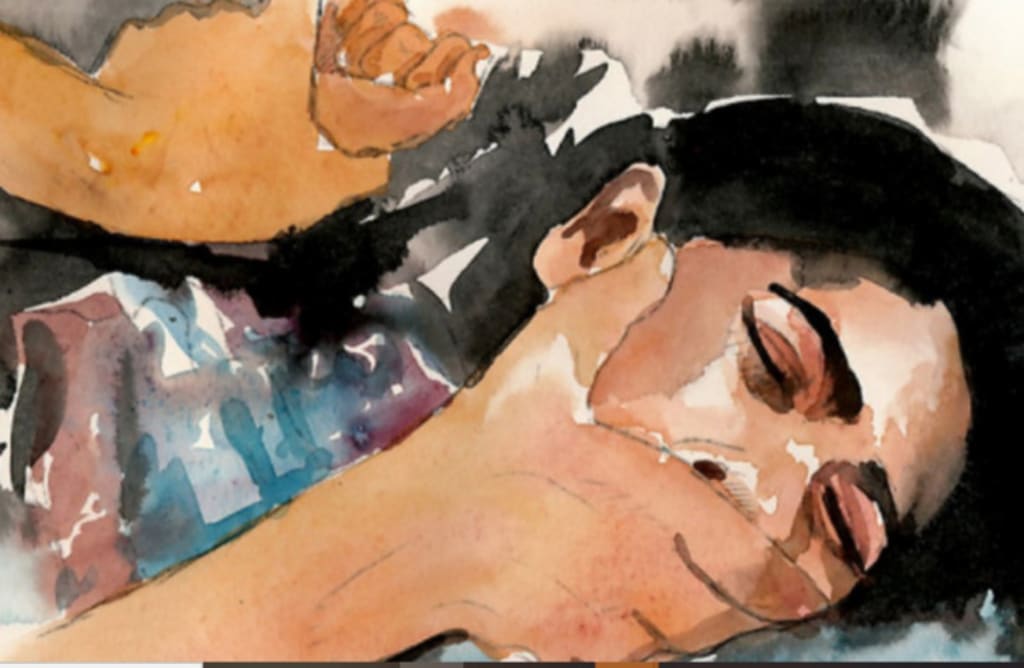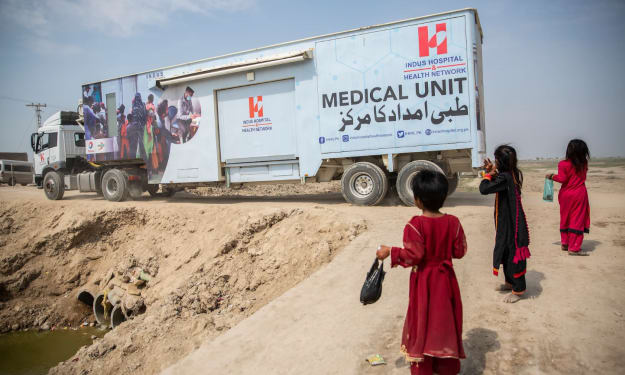Coping with Sexual Violence
Sexual violence is pervasive in many modern conflicts. The International Commission is committed to stepping up efforts to prevent this crime and assist victims.

Despite explicit legal prohibitions, sexual violence remains widespread and pervasive in armed conflict and other situations of violence, as well as in places of detention. It happened in different countries and regions, and caused serious humanitarian consequences. Sexual violence is often used as a tactical or strategic tool to overwhelm and weaken adversaries by directly or indirectly targeting the civilian population.
Sexual violence rarely exists in isolation. It is often part of a pattern of violence associated with other violations of international humanitarian law such as torture, killing, looting, recruitment of children or destruction of property. When linked to conflict situations, it can exacerbate existing sexual and gender-based violence among civilians — such as marital rape and child marriage.
These factors can also lead to the emergence of new trends or patterns, such as sex trafficking or sex for survival, and trafficking for sexual exploitation or abuse.
The vast majority of survivors of sexual violence are often women, girls, sexual and gender minorities, but anyone can be affected. Given the devastating and wide-ranging consequences of sexual and gender-based violence on individuals, a survivor-centred response (including comprehensive health, mental health and psychosocial care, legal aid, and protective services) Influencers matter.
To implement the response, the ICRC provides relevant services and refers a coordinated network of experts. In addition, the ICRC ensures that the risk of sexual and gender-based violence is reduced in program design and assists survivors, including through community-based livelihoods programmes, including discussions with mental and psychosocial health representatives on how to prevent sexual violence.
Sexual violence is often a sensitive issue, and while addressing it is a clear legal and humanitarian imperative, it is often viewed as a major "taboo" that is difficult to address.
The annual Sexual Violence Special Appeal was launched in 2013 to break the taboo, support authorities in tackling the issue and ensure care for survivors of sexual violence. The committee has launched the call every year since then.
The call states:
Sexual violence is a gendered phenomenon rooted in gender and social inequalities, and the disparate impact of gender norms and discrimination (including high barriers to access for some populations) that affect different populations. A variety of factors, including sexual orientation, gender identity, race, ethnicity, and style of expression, can affect the extent to which a person is at risk.
We believe that earmarked and thematic funding can draw attention to this otherwise largely unnoticed issue in humanitarian action, and help humanitarian responses achieve program results, reach more people, and provide longer-term security, And improve leadership, technical and cultural capabilities.
The International Council has launched the Sexual Violence Prevention Project, which aims to strengthen our various work streams in the prevention of sexual violence. This five-year project will improve our ability to alleviate human suffering. The project will provide additional support to the International Commission's front-line prevention work to reduce the risk of sexual violence perpetrated by weapon bearers, while building resilience in conflict-affected communities. A robust monitoring and evaluation component will help the ICRC and other humanitarian actors gain a better understanding of how to effectively prevent sexual violence.
Lord Ahmed, the Prime Minister's Special Representative on the Prevention of Sexual Violence in Conflict, MPs, representatives of NGOs, those working in the field of sexual violence and survivors' rights advocates generously shared their stories at the meeting , and described some of the challenges they faced.
All Party Parliamentary Group Chairman Anthony Mangnall MP, All Party Parliamentary Group Deputy Chairman Fleur Anderson MP and Lord Ahmed delivered opening remarks for the meeting. Lord Ahmed made it clear: "Policy must be made with the survivors in mind and with them at the center."
Hilary Douglas of the British Red Cross echoed the sentiment: "We strongly believe that to avoid further harm, decisions about health services, socio-economic support and justice must be based on the wishes and need-based."
"However, the survivor-centred approach to work, despite its growing acceptance in policy development and the availability of many guidance and resources, countries have yet to fully translate it into meaningful practice in healthcare This is especially the case with regard to the judicial system."
Give Survivors a Voice
The conference's first speaker will be Kolbassia Haoussou, OBE and director of Survivor's Voice. Voices of Survivors, co-founded by Corbacia in 2007, is the UK's only network led by a torture survivors' organisation. Corbacia emphasized the need for a holistic, survivor-centred approach to sexual or gender-based violence.
"The first order of business in this approach is a commitment. A commitment to listen to survivors and put their advice into action," he said.
"The second task is to create a safe space that provides protection and allows survivors to feel comfortable participating without fear of being harmed as a result."
"The third task of a survivor-centred approach is to create a space that empowers and engages survivors, while at the same time disempowering perpetrators and removing stigma. "
What kind of justice is achieved?
Human rights activist Nadine Tunasi leads Survivor Voices' online policy and research team. Nadine and Corbacia are currently serving as Survivors' Rights Advocates for the Prevention of Sexual Violence in Conflict Initiative alongside Lord Ahmed. They work to ensure that survivors are at the heart of decision-making and policy development.
Nadine talks about the concept of justice and how it should apply to survivors of sexual and gender-based violence.
"For survivors, justice is a distant concept," Nadine said.
"Justice is such a big concept. And from my own experience and talking to other survivors, people often misunderstand the word justice."
"Effective justice is meaningful for survivors. We need to see survivors as individuals with special needs.
What is the price to be paid for justice?
The second speaker, Esperande Bigirimana, explored the topic of what justice means. Born in Burundi, Esplande is a survivor's rights advocate and women's rights activist. She describes the barriers survivors face in seeking justice through formal channels, and reflects on what governments and organizations can do to support them.
Esplande reminds us that, for many survivors, speaking out comes at a cost.
"Many survivors have been threatened, kidnapped and even killed simply for speaking about what happened to them," she said.
"We can say that our legislation is very advanced and enlightened. But in practice, this legislation does not protect survivors as they seek justice."
Men are less likely to seek help
Although the majority of victims of conflict-related sexual violence are women and girls, men and boys are also affected. Anthony Keedi, Technical Advisor for Masculinity at the ABAAD Gender Equality Resource Center, has spent the past 30 years conducting pilot and outreach efforts in Lebanon, advocating for men to act to end violence against women and men.
Anthony described the various barriers faced by men or boys seeking support.
"Men are less likely to seek help because it is perceived as effeminate or demeaning, especially when they are survivors of sexual violence seeking help for castration," he said. in this way.
"In this context, sexual violence can become a weapon of war. Sexual violence against men is intended to weaken their power or depreciate its value.
"If you take away that identity from them, you take away their value."
"The same is true when a woman, girl or boy is subjected to sexual or gender-based violence, while men are forced to look on. What people must understand is that the patriarchal concept of patriarchal violence is sexual and gender-based violence The root of the behavior. This is true for both female and male victims.
Anthony responded to the question of how stigma prevents survivors from accessing health care, other vital services, and seeking justice:
"Stigmatization is a classic form of misinformation. We are so busy asking survivors why this happened to them, how it affects them, but no one asks about the perpetrator. "
What role can NGOs play in supporting survivors in their search for justice and access to vital services?
Harriet Kezaabu is the International Rescue Committee's Women's Protection and Empowerment Coordinator in Kampala, Uganda.
"The International Rescue Committee's guiding principles promote confidentiality, non-discrimination and respect to ensure the dignity of women and girls is maintained at all times."
"This means that, when working with survivors, we must always ensure that their experiences, rights and decisions are respected, including ensuring that survivors' data privacy is always protected."
May Maloney is an ICRC adviser on sexual violence, based in Geneva. She explained to the audience a problem that we and other organizations have noticed on the ground: Mandatory reporting has many unintended consequences.
What is the Mandatory Reporting System?
Rachael Cox, policy adviser at the ICRC delegation in the UK and Ireland, said: "It is great to have so many speakers today. It gives us an opportunity to illustrate what will survive when policy is developed to support The importance of placing survivors at the center also raises our awareness of the challenges and obstacles they face in their quest for justice.
"Institutions that were established with good intentions, such as mandatory reporting, to address impunity now have a negative impact on victims (survivors), making it difficult for them to access health care and further subjected to violence and injury."
"As Nadine puts it, 'We need to see survivors as individuals with special needs. For survivors, effective justice makes sense.'"
About the Creator
Reader insights
Nice work
Very well written. Keep up the good work!
Top insight
Heartfelt and relatable
The story invoked strong personal emotions





Comments (1)
very nice